- Home
- Sara Craven
Inherited By Her Enemy (HQR Presents) Page 2
Inherited By Her Enemy (HQR Presents) Read online
Page 2
There was an appalled silence. Ginny stared at the man sitting beside the solicitor, his dark face expressionless. Andre, she thought. The French version of Andrew. And, while she’d been aware of some faint familiarity, Barney—Barney had known in some unfathomable way. Barney had recognised him as family.
Then: ‘Natural son?’ Rosina repeated, her voice rising. ‘Are you telling me that Andrew has left everything—everything—to some—some bastard? Some Frenchman none of us have heard of until now?’
‘But I, madame, have heard a great deal about you,’ Andre Duchard said silkily. ‘I am enchanted to make your acquaintance at last.’
‘Enchanted?’ Rosina gave a harsh laugh. ‘Enchanted to think that you’ve robbed me of my inheritance, no doubt. Well, don’t count your chickens. Because I intend to fight this outrage if it takes everything I’ve got.’
Which at the moment, thought Ginny, is forty thousand a year and the use of a cottage. Damn all else. As for me—well, I can’t think about that now. The priority is damage limitation.
She put an arm round her mother’s shoulders. She said quietly, ‘I’m sorry, Mr Hargreaves, but I think we’re all in a state of shock. As my mother says, we hadn’t the least idea that Monsieur Duchard existed. But I imagine Andrew arranged for his heir’s credentials to be thoroughly checked.’
Mr Hargreaves took off his glasses and wiped them carefully. He said, ‘Indeed, yes. Mr Charlton always knew he had a son, and obtained legal recognition of his paternity according to French law. He also has letters and photographs going back to the time the boy was born, which my father kept for him in a box at our offices.’ He paused again. ‘This was a matter of discretion as Mrs Josephine Charlton was still alive at that time, and our client was anxious not to distress her.’
‘And what about my feelings?’ Rosina demanded tearfully. ‘He wasn’t so caring about them. Ten years of devotion rewarded by a pittance and the use of a hovel!’
Ginny groaned under her breath, stingingly aware of Andre Duchard’s sardonic smile, as he absorbed every word and gesture, then froze as he looked directly at her, the dark brows drawing together as if he’d been presented with a puzzle he had yet to master.
Hastily, she averted her gaze.
‘Mother, why don’t you come upstairs and lie down,’ she suggested gently. ‘I’ll ask Mrs Pelham to make you some tea and...’
‘I want nothing from that woman. Don’t you realise Andrew has treated me the same as her—a servant—in this disgusting will? Oh, how could he do such a thing? He must have been quite mad.’
Her eyes suddenly sharpened. ‘But of course, that’s it. Something must have disturbed the balance of his mind. Isn’t that what they say?’
‘I think you are referring to suicide, madame,’ Andre Duchard corrected gently.
‘Well, whatever.’ Mrs Charlton waved a dismissive hand. ‘We can still have the will overturned. You hear about such things all the time.’
‘I strongly advise against any such action,’ Robert Hargreaves said gravely. ‘You have no case, Mrs Charlton. Your husband was a sane and rational man, who wished to openly recognise his son born outside wedlock. The will I have just read was drawn up two years ago.’
‘But if this man is really Andrew’s son, why is he called—Duchard or whatever it was? It sounds bogus to me.’
The Frenchman spoke. ‘Duchard, madame, is the family name of my stepfather, who adopted me when he married my mother. I hope that sets your mind at rest,’ he added silkily.
Seeing that Rosina’s face had reddened alarmingly, Mr Hargreaves intervened. ‘I suggest you take Virginia’s advice, Mrs Charlton, and rest for a while. We will speak again in a day or two, when you’re feeling calmer. There are other important matters that need to be discussed.’
‘You mean I still have a bedroom in this house?’ Rosina glared at both men. ‘Your client isn’t proposing to move in here and now?’
‘I would not put you to such trouble, madame.’ There was a thinly veiled note of amusement in Andre Duchard’s cool tones. ‘I have a reservation at the hotel in the village, while I too have discussions with Monsieur Hargreaves.’
‘May I offer you a lift, monsieur?’ Robert Hargreaves was thrusting documents back into his briefcase, his relief palpable. ‘I see you dismissed your taxi.’
‘Merci. But with the flight and the journey here, I have been sitting too much. I think I will walk.’ He put on his trench coat and swung the leather bag on to his shoulder.
As they turned to leave, Barney emerged from the desk and stood watching their departure, ears flattened and tail drooping, as if he felt he’d been deserted a second time.
It was a sentiment that Ginny had her own reasons to share. But she made herself accompany the two men to the front door and wish them a polite ‘Good evening,’ adding haltingly, ‘I hope you understand my mother is very upset.’
‘Of course,’ Mr Hargreaves agreed reluctantly. ‘I will postpone any further meetings with her until next week. Goodbye, my dear. I’m sure things will seem different in the morning.’
She smiled and nodded, reflecting bitterly that there was a very long evening to get through first.
‘Au revoir, Virginie.’ The drawled French version of her name made it sound softer, giving it an almost sensual intonation, she realised with sudden embarrassment. Not that he had any right to use it. She felt her face warm and had to restrain herself from taking a step back, in order to put extra distance between them. ‘Et à bientôt,’ he added.
And this time the note of mockery was unmistakable, as he must know he was the last person she would ever wish to see again, soon or late.
She murmured something evasive, and shut the door, recalling how earlier she’d thought the worst was over.
With a sigh, she took herself off to the kitchen, to find Mrs Pelham sitting at the large scrubbed table reading a letter.
She said, ‘Don’t disturb yourself, Mrs Pel. I’ve come to make some tea. I’m afraid we’ve all had rather a shock.’ She paused. ‘It seems Mr Charlton has an illegitimate son—a Frenchman called Andre Duchard—and made him his sole heir.’
As she watched the housekeeper slowly remove her glasses and return them to their case, she added, ‘But perhaps you knew that already.’
‘No, Miss Ginny. But I knew there was something up earlier, Mrs Charlton having a carrying sort of voice, and Mavis all ears.’ She was silent for a moment. ‘So this French gentleman gets everything. Well, well.’
‘However, it doesn’t affect you,’ Ginny hastened to assure her. ‘Mr Charlton has made sure you’ll be taken care of.’
‘Now that I did know,’ Mrs Pelham said calmly. ‘He sat me down and talked it over with me two months since, and when Mr Hargreaves arrived, he gave me this letter with it all set out.’ She added with sudden fierceness, ‘He was a good man, the master, and I’ll never say otherwise, even if he didn’t always find the happiness he deserved.’
Ginny filled the kettle and set it on the big gas range. She said quietly, ‘Mrs Pel—have you any idea who Mr Duchard’s mother might have been?’
‘I can’t be certain, Miss Ginny.’ The housekeeper rose stiffly and began to assemble cups and saucers on a tray. ‘But I remember Linnet Farrell, the late Mrs Charlton’s companion. Here for a year she was, then one day she was gone, to nurse her sick mother it was said. Except she’d told me once that her parents were dead.’
Ginny retrieved the milk from the fridge and filled a jug. ‘What was she like?’
‘Not much in the way of looks,’ said Mrs Pelham. ‘But there was a sweetness about her just the same, and she made the house a brighter place. And Mrs Josie took to her too, for a wonder.’
Ginny said slowly, ‘I gather she was an invalid.’
‘Nerves,’ said Mrs Pelham. ‘And disappointment
. That’s what it was at the start. She wanted a baby, you see, and it didn’t happen. Three miscarriages, all at four months, in as many years, and the doctors warning her she’d never carry a child full-term. She got into one of those depressions. Ended up in a nursing home, more than once.’
She sighed, ‘And when she was back at home, she spent all her time in bed, or lying on a couch. And poor Mr Charlton having to sleep in another room, as well.’
She lowered her voice. ‘I’m sure she loved him, but I don’t think she was very keen on married life, as it were. Not unless there was going to be a baby to make it worthwhile. But a man wouldn’t see it like that.’
No.’ Ginny emptied sugar into a bowl. ‘I—I don’t suppose he would.’
‘And suddenly there was this kind, warm-hearted girl living in the house, and he was an attractive man when he was younger. Not that I ever saw anything untoward, mind you,’ she added hastily. ‘And Linnet was good for Mrs Josie. Got her out and about, driving her car, and even doing some gardening.
‘But one day she just upped and left. Came in the kitchen to say goodbye, and it was plain she’d been crying.’ She sighed again. ‘And later on, Mrs Josie really did become ill, poor soul, with Parkinson’s disease, and Mr Charlton was as good to her as any husband could be, and enough said.’
She nodded with a kind of finality then glanced at the Aga. ‘And that kettle’s boiling, Miss Ginny.’
Ginny’s mind was whirling as she carried the tray into the study, but the torrent of grievance which greeted her soon brought her back to earth.
‘Well, at least you’ve got this annuity thing, Mother,’ Cilla was saying furiously. ‘Whereas he didn’t leave me a penny, the old skinflint.’
Ginny put the tray on the desk. She said mildly, ‘Perhaps he thought it was unnecessary, as you’re marrying into one of the richest families in the county.’
Cilla turned on her. ‘And you’re getting nothing too, so all that trying to wheedle your way into his good books was a waste of time. You’re going to be worse off than any of us,’ she added almost triumphantly.
‘So it would seem,’ Ginny agreed, sounding more cheerful than she felt, as she poured the tea. ‘But please don’t worry about it.’
‘I’m not,’ her sister said sulkily. ‘I just want to know how we’re going to pay for my wedding. Mother, you’ll have to talk to Mr Hargreaves. Get some more money out of him somehow.’
As Ginny poured out the tea, she noticed something. ‘Where’s Barney?’
‘I put him outside,’ said her mother. ‘I couldn’t bear him in the room a moment longer,’ she added, fanning herself with her handkerchief.
Ginny put down the pot. ‘You do realise he might have wandered off?’
‘What if he has? I told you I’m getting rid of him.’
‘You can’t do that,’ Ginny flung over her shoulder as she headed for the door. ‘Like everything else in this house, he probably belongs to Monsieur Duchard. And he’s a valuable dog.’
She huddled on her quilted jacket, pulled on her Wellington boots and grabbed a leash and a torch from the shelf in the boot room before letting herself out through the back door. The temperature outside wasn’t much above freezing, and she could see her breath like a cloud in front of her as she skirted the house, softly calling Barney’s name, hoping he would be waiting anxiously on the terrace for readmission.
But there was no sign of him. Biting her lip, she went round to the side gate, left carelessly open, probably by the departing Mavis, and stepped out on to the lane leading to the common.
As she walked, she called again, sweeping the area with her torch, knowing that he could be anywhere. As she reached the edge of the common, she took a deep breath then gave three soft whistles as Andrew used to do.
In the distance, there was an answering bark and a moment later, Barney came loping into view, tail wagging and tongue hanging out.
‘Good boy,’ Ginny said, sighing with relief as she attached the leash to his collar, but as she turned back towards the house, he resisted, standing stock still, staring back the way he’d come, and whimpering softly and excitedly.
As if, she thought, he was waiting for someone. She raised the torch, aiming the beam across the scrubby grass and clumps of gorse. She said sharply, ‘Who’s there?’
But there was no reply or sign of movement, and after a moment or two, Barney came out of alert mode and turned obediently for home.
You, my girl, she told herself grimly, had better stop being over-imaginative and get down to practicalities—like where you’ll go, and how the hell you’ll earn your living.
And, as she trudged back to the house, she found herself wishing, with a kind of bitter despair, that she’d never heard the name of Andre Duchard. Or, better still, that he’d never been born.
CHAPTER TWO
WHEN GINNY GOT back to the house, she found her mother alone in the drawing room.
She said, ‘Where’s Cilla?’
‘Off to the Manor to consult Jonathan about this appalling situation.’
‘In what way—consult?’
‘How we can fight this fraudulent will, of course,’ said Rosina, the ominous throb returning to her voice. ‘Oh, I can hardly bear to think of Andrew—his deceit—his betrayal of me. Of our love.’
She shook her head. ‘To have had a son—in secret—all these years, and said nothing to me—his wife. It beggars belief. It makes me almost wish...’
She broke off abruptly. ‘Get me a brandy, Virginia. A large one. I need something to settle my nerves.’
As Ginny busied herself with the decanter on a side table, Rosina added abruptly, ‘You’re so fortunate not to suffer in this way. Cilla and I are so sensitive, but nothing ever seems to affect you.’
‘That’s not true,’ Ginny said quietly, as she brought her mother the brandy. ‘But I don’t see any mileage in fussing over things I can’t change.’
‘But if we all stand together...’
‘We could end up looking grasping and silly.’
‘You might change your tune if you were the one faced with penury.’
If only you knew, Ginny thought bitterly. Aloud, she said mildly, ‘It’s hardly that, Mother. Whole families have to manage on much less.’ She paused. ‘Why don’t we go over tomorrow and have a look at the cottage? It may not be as bad as you think.’
Rosina tossed her head. ‘You go, if you want. I refuse to set foot in the place.’ She produced a handkerchief. ‘Oh, Andrew, how could you do this to me?’
To which, presumably, no answer was expected. Ginny waited until Rosina had drunk some of her brandy, then suggested they should watch some television, figuring correctly that she would again be accused of being without feelings.
All the same, her mother allowed herself to be persuaded, and was soon deep in a drama series she enjoyed, leaving Ginny to pursue her own unhappy train of thought.
The Meadowford Café was the official name of her present place of employment, but it had never been known in the village as anything but ‘Miss Finn’s’.
The original Miss Finn had been a cook in some very exclusive households before deciding to open her own establishment in an area where she’d spent several holidays and which she’d grown to love.
A round rosy lady, her phenomenally light hand with cakes and pastry had made the business a roaring success, opening for morning coffee, serving light lunches of homemade quiches, open sandwiches and interesting salads, and closing once afternoon teas had been served.
And when she eventually retired, her place was taken and her high standards maintained by her unmarried niece, Miss Emma Finn, also pink-cheeked and on the plump side and considered locally, with kindly affection, as another born spinster.
Ginny, her school days behind her, and with respectable exam r
esults to treasure, had considered teaching as a career, but her mother had reacted in horror, protesting that Ginny was needed at home.
‘Such an enormous house to run single-handed, and Mrs Pelham not really pulling her weight any more. And really, you owe it to Andrew.’
Eventually, Ginny had reluctantly agreed, only to find herself caught between her mother’s steely resolve and Mrs Pel’s stony resistance. After three largely unproductive months doing very little, she saw a card in Miss Finn’s window asking for part-time assistance, applied and got the job.
‘You’re going to be a waitress?’ Mrs Charlton had been appalled. ‘But you can’t possibly. Whatever will Andrew say?’
Which had turned out to be ‘Good for you,’ accompanied by a wink and a pat on the shoulder.
To Ginny’s own surprise, she enjoyed working at Miss Finn’s and it wasn’t long before she joyously accepted Miss Emma’s offer of full-time work.
Three years on, Ginny was still enjoying herself, while giving Mrs Pelham unobtrusive and now welcome support at home too.
However, a few months ago, Miss Emma had, to everyone’s astonishment, announced her engagement, with the news that she would be moving to Brussels after her marriage.
So a quick decision about the future of the café was needed. The premises were leased from the Welburn estate, so all she needed was someone to buy the actual business, and she had offered first refusal to Ginny.
‘I suppose it should be Iris Potter,’ she’d confided anxiously, ‘as she’s been here the longest, but she does so rub people up the wrong way. And while you’re young, Ginny, you’re such a capable girl and the customers like you.’
It was, Ginny knew, a wonderful opportunity, but Miss Finn clearly had no idea of her financial position. Andrew, it was true, made her an allowance, which he’d increased once he realised just how much she did in the house, but, apart from her wages, that was it.

 The Marchese's Love-Child (The Italian Husbands)
The Marchese's Love-Child (The Italian Husbands) Inherited By Her Enemy (HQR Presents)
Inherited By Her Enemy (HQR Presents) His Wedding-Night Heir (Wedlocked!)
His Wedding-Night Heir (Wedlocked!) The Token Wife
The Token Wife Mistress on Loan
Mistress on Loan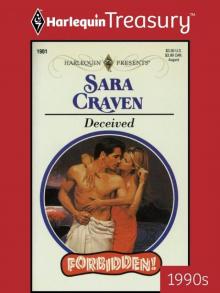 Deceived (Harlequin Presents)
Deceived (Harlequin Presents)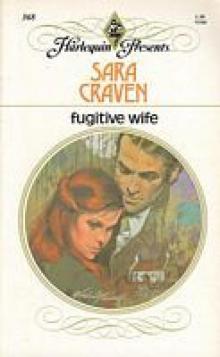 Fugitive Wife
Fugitive Wife Desperate Measures
Desperate Measures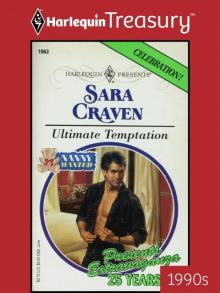 Ultimate Temptation (Harlequin Presents)
Ultimate Temptation (Harlequin Presents) The Highest Stakes of All
The Highest Stakes of All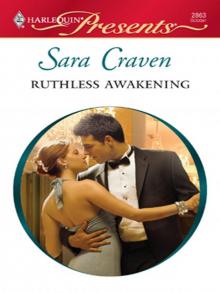 Ruthless Awakening
Ruthless Awakening Rome's Revenge
Rome's Revenge Forced Bride
Forced Bride Summer of the Raven
Summer of the Raven Smokescreen Marriage
Smokescreen Marriage The Innocent's Shameful Secret
The Innocent's Shameful Secret Marriage by Deception
Marriage by Deception The Virgin s Wedding Night
The Virgin s Wedding Night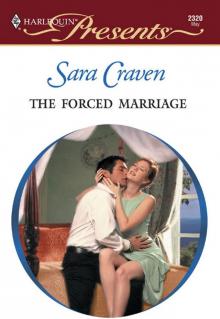 The Forced Marriage (Italian Husbands)
The Forced Marriage (Italian Husbands) The Innocent's Sinful Craving
The Innocent's Sinful Craving Inherited by Her Enemy
Inherited by Her Enemy Wife in the Shadows
Wife in the Shadows The Innocent's Surrender
The Innocent's Surrender Storm Force
Storm Force The Seduction Game (Harlequin Presents)
The Seduction Game (Harlequin Presents) The Santangeli Marriage
The Santangeli Marriage In the Millionaire's Possession
In the Millionaire's Possession The Forced Marriage
The Forced Marriage Alien Vengeance
Alien Vengeance A Nanny for Christmas
A Nanny for Christmas His Reluctant Bride
His Reluctant Bride Heart of a Hero
Heart of a Hero The Price of Retribution
The Price of Retribution Irresistible Temptation
Irresistible Temptation Dark Apollo
Dark Apollo Marriage at a Distance (Presents, 2093)
Marriage at a Distance (Presents, 2093) Count Valieri's Prisoner
Count Valieri's Prisoner The Innocent's One-Night Confession
The Innocent's One-Night Confession Bartaldi's Bride
Bartaldi's Bride His Untamed Innocent
His Untamed Innocent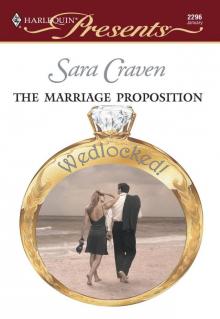 The Marriage Proposition
The Marriage Proposition The Right Bride?
The Right Bride? The End of her Innocence
The End of her Innocence